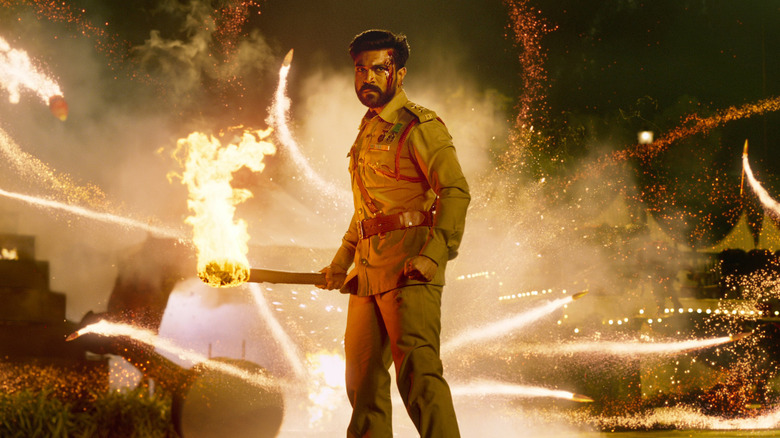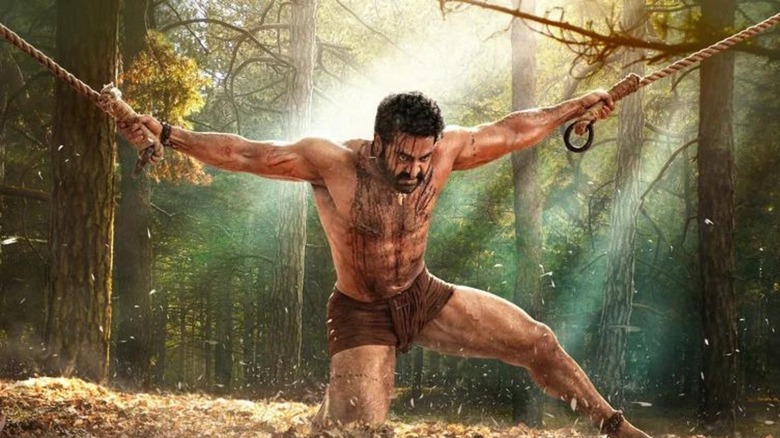S.S. Rajamouli Looked To The Fans To 'Expand' The Title Of RRR
Indian filmmaker S.R. Rajamouli's Telugu-language movie "RRR" is easily last year's most outlandish, elaborate, and entertaining title — it is an epic celebration of movies at its best. "RRR" is enormous in scope and is a star-studded blockbuster that makes its intimidating three-hour runtime the most fun experience you will have at the cinema. The film stars actors N. T. Rama Rao Jr. and Ram Charan who play fictional versions of real-life Indian freedom fighters Komaram Bheem and Alluri Sitarama Raju, and its events borrow inspiration from two of India's epic texts: the Rāmāyaṇa and the Mahābhārata.
Although the real folk heroes never met, the film imagines their fight against British colonialism in the 1920s. The historical fantasy has a lot going for it: the visual effects are astonishing, the music is littered with spectacle and performance, and the film has a pretty catchy title — "RRR" really does roll off the tongue. You'd think the title works as a callback to a special reference in the film, but it's not. It is never mentioned in the film's three-hour runtime, and director Rajamouli has finally explained the story behind it.
The film has multiple titles
N. T. Rama Rao Jr. and Ram Charan portray real-life rebels turned superheroes in "RRR," where they search for a kidnapped girl, engage in a face-to-face battle with a tiger, and dance against imperialism among other things like revolting against the British empire. The film's title never becomes a part of the plot and is never mentioned in a dialogue between characters, which has left fans wondering about its meaning. In a world where films are teeming with Easter eggs: how could the letters RRR mean nothing?
Filmmaker S.S. Rajamouli detailed the story on Late Night with Seth Meyers, explaining to the host how RRR was a prototype for the film's title: they're the initials of the filmmaker and the two actors starring in the movie. It was catchy and stuck with the fans, but Rajamouli asked viewers to "expand" on the title themselves. While the film's common title is "RRR," the dubbed versions (there are five in India, itself) go by different names. For instance, the English dub reads: "Rise Roar Revolt" and in the original Telugu, it is called "Roudram Ranam Rudhiram."
'That's not the title we had in mind'
Rajamouli told Meyers that "RRR" wasn't the title they had in mind — it was a catchy caption for his photo.
"... When we announced that all three of us are going to work together, we had to give out some name to refer to the picture. So we took the first letters of our names, Rajamouli, Rama Rao, Ram Charan, and we just put #RRR. It was just a name to refer to the picture, not the actual title."
The filmmaker continued, explaining how fans began referring to the project as "RRR" right away.
"But the fans started with the title. They loved the title. The distributors of our films loved the title. They said, 'This is the title.' So we didn't know what to do and said, 'Okay, guys. 'RRR' can't be the title.'
... The film is dubbed into five languages in India itself. So we put a competition for the audiences, for the fans, saying that 'You expand the title.' So we have that title for each region, for each language. But the common title will stay as RRR."
In November 2017, Rajamouli shared a picture of Rama Rao Jr., Ram Charan, and himself to his social media handles, using the letters as an abbreviation for the trio in his caption. The film might have a different name with every language dub — but audiences in India and worldwide have grown fond of the original, "RRR."


